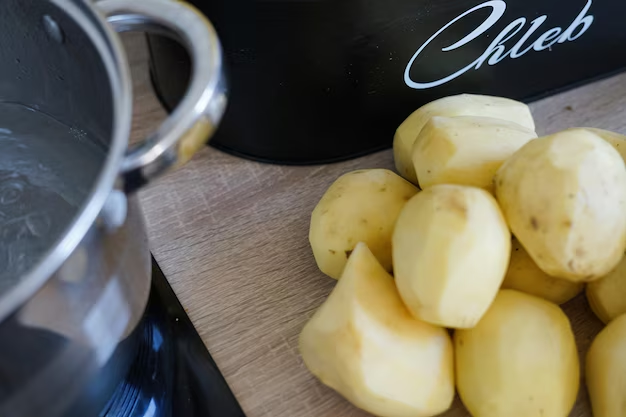How Long Do Boiled Potatoes Stay Fresh in the Fridge? A Complete Guide to Storing Your Spuds 🥔
Imagine returning home from a hectic day, craving a quick and satisfying meal. You open your fridge, hoping those boiled potatoes you prepared a few days ago are still good. But how long do boiled potatoes actually last in the refrigerator? This guide will answer that exact question and offer storage tips to ensure your potatoes stay fresh as long as possible.
In the realm of food storage, understanding the shelf life of your ingredients can significantly impact the quality of your meals and, importantly, reduce food waste. Potatoes, a staple in many households, are the perfect example of a food item that's frequently cooked in batches, making proper storage key.
How Long Can You Store Boiled Potatoes in the Refrigerator?
Boiled potatoes, when properly stored, are typically good for up to 3-5 days in the refrigerator. However, several factors can affect this time frame, such as how they were cooked and the conditions in which they are stored.
Factors Affecting Shelf Life
Cooking Method: The way you boil your potatoes—whether whole or cubed—can influence their longevity. Whole boiled potatoes may retain freshness longer because there is less surface area exposed to air that can lead to quicker spoilage.
Storage Conditions: Proper refrigeration is crucial. Potatoes should be stored in airtight containers or tightly wrapped with plastic wrap or aluminum foil to minimize moisture loss and prevent exposure to air.
Added Ingredients: If you’ve added seasoning, butter, or oils before storing, this can sometimes reduce the shelf life as these ingredients may spoil faster than the potatoes themselves.
Signs of Spoilage:
- Odor: A sour or rancid smell is a clear indicator that the potatoes have gone bad.
- Texture: Sliminess or mushy spots suggest bacterial growth.
- Appearance: Any visible mold or discoloration means the potatoes should be discarded.
Tips for Storing Boiled Potatoes 🧊
Proper storage is key to maintaining freshness. Here are some practical tips to maximize the shelf life of boiled potatoes:
Cool Them Quickly: Allow the boiled potatoes to cool down before refrigerating. This step helps prevent the accumulation of condensation inside the storage container, which can lead to sogginess and spoilage.
Use Airtight Containers: Ensure you use containers with tight-fitting lids to store your potatoes. This not only keeps them fresh longer but also prevents odors from other foods from seeping in.
Keep Away from Raw Foods: Store them separate from raw foods, especially meats, to avoid cross-contamination.
Summary Section:
🔑 Key Storage Tips:
- Cool potatoes first before placing them in the fridge.
- Use airtight containers or wrapping.
- Keep away from raw meats to prevent contamination.
To Freeze or Not to Freeze? That is the Question
Can You Freeze Boiled Potatoes?
Freezing can be an excellent method for extending the shelf life of boiled potatoes past the few days the refrigerator allows. However, there are pros and cons to this approach.
Pros:
- Extended Shelf Life: Frozen boiled potatoes can last up to 3 months.
- Convenience: Pre-cooked potatoes are perfect for quick meal prep.
Cons:
- Texture Changes: Freezing may alter the texture, making them less firm.
- Flavor Impact: The flavor may be slightly altered as well.
How to Freeze Boiled Potatoes
Flash Freeze: Lay potatoes on a baking sheet in a single layer and freeze for a couple of hours before transferring them to a freezer bag or container. This prevents them from sticking together.
Use Within 3 Months: For best quality, consume within three months.
Label & Date: Always label the container or bag with the freeze date for easy tracking.
How to Properly Thaw and Reheat Frozen Boiled Potatoes
Thawing Techniques
- Refrigerator Method: Thaw in the refrigerator overnight for the best texture retention.
- Microwave: Use the defrost setting on your microwave for a quicker method, but be cautious of uneven heating.
Reheating Tips
- Oven: Reheat in an oven preheated to 350°F (175°C) until heated through.
- Stovetop: Sauté with a little oil or butter to revive the texture and add flavor.
Final Thoughts on Reheating:
When reheating, ensure potatoes reach an internal temperature of 165°F (74°C) for safe consumption.
Boiled Potatoes in Your Diet: Versatile and Easy
Boiled potatoes offer versatility in meal planning, fitting into various cuisines and dietary needs. From mashed potatoes to salads and casseroles, they are a perfect backdrop for other ingredient stars.
Health Benefits of Potatoes
- Nutrient-Rich: Potatoes are packed with essential nutrients like vitamin C, B6, and potassium.
- Low-Calorie Density: They are relatively low in calories yet filling, making them a wise choice for weight management.
Takeaway: Enjoy the nutrient benefits of potatoes by keeping multiple preparation options at your fingertips.
Practical Summary: Make the Most Out of Boiled Potatoes
Here's a compact guide on how to handle boiled potatoes efficiently:
| Stage | Tips |
|---|---|
| Storage | Cool before refrigerating; use airtight containers; separate from raw foods. |
| Freezing | Flash freeze; use within 3 months; label with dates. |
| Thawing & Reheating | Thaw overnight in fridge; reheat thoroughly to 165°F. |
| Health Benefits | Nutrient-rich; versatile in dishes; sidekick to healthy meal planning. |
By following these guidelines, you'll maximize the shelf life of your boiled potatoes and enhance your cooking experience. This knowledge not only helps in reducing food waste but also supports healthier meal planning.
In the kitchen, understanding how to optimally store food is fundamental, and with potatoes, you've got a tasty and versatile ingredient at your disposal!

